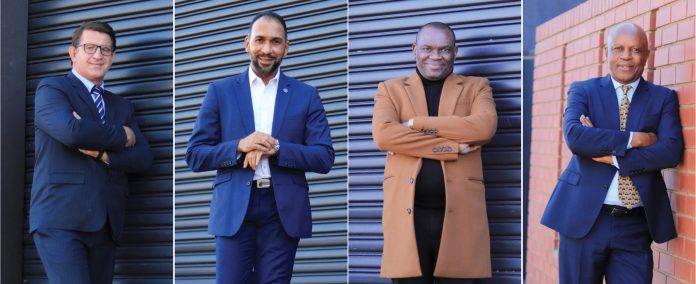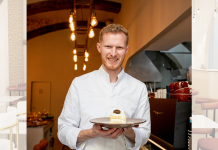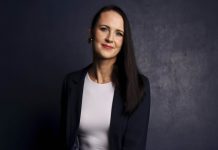Prof. Henk de Jager: Vice-Chancellor and Principal
Henk de Jager leads the management of the university by providing strategic direction, effective administration and operational management, financial sustainability and support to CUT on academic and support services matters, under the oversight of the CUT Council.
What Prof. De Jager enjoys most about his job, is seeing a first-year student, fresh out of school, develop into a young and dynamic adult who is eventually ready to take on the world of work with confidence and commitment as a graduate. He takes pleasure in watching the joy of parents and guardians at graduation ceremonies. When staff members move from being young junior lecturers and newly appointed junior support staff members to reaching their full potential by growing in their jobs, enjoying their work experience, utilising opportunities to develop, and eventually becoming professors or senior offi cials at the university, Prof. De Jager takes pride in their accomplishments.
According to Prof. De Jager, he never holds grudges against people. He always tries to understand where the person is coming from. He also tries very hard to always see the glass as half full, and not half empty and this is the mind-set that makes him successful.
Prof. De Jager matriculated from Hoër Tegniese Skool upington in 1982, completed the compulsory two years military service and commenced with his studies at the then Vaal Triangle Technikon in 1985. He then obtained an MDipTech in Electrical Engineering; BA in Industrial Psychology; Postgraduate Diploma in Tertiary Education; and a DTech in Education Management. After working in industry for four years as Trainee Certified Engineer at ISCOR, he commenced his academic career as a lecturer in 1989, and was appointed as Associate Director: Cooperative Education in 1993. To date, Prof. De Jager has 32 years’ experience in higher education at various institutions. He has held the position of Deputy Vice-Chancellor (DVC): Academic and Research at CUT from 1 July 2012 to 31 December 2015, after which he was appointed as the DVC: Research, Innovation and Engagement at CUT. He was appointed as Acting Vice-Chancellor and Principal of CUT on 1 October 2016, and as Vice-Chancellor and Principal of the same institution with eff ect from 1 June 2017.
Prof. De Jager says CUT focuses on the concept of entrepreneurship, which encourages innovative thinking, not only for the students and staff, but the wider CUT community. CUT offers various programmes, such as the Entrepreneurial Matriculant of the Year competition, which allows them to develop a culture of entrepreneurship in schools, and an entrepreneurial drive and spirit amongst the youth; the Idea Generator and Fabrication Lab in Bloemfontein and Welkom as well as CUT Innovation Services, which focuses on commercialisation.
CUT’s Vision 2030 Statement states that “By 2030, the Central university of Technology, Free State will be a leading African university of technology, shaping the future through innovation”. This vision was developed during 2019/2020 through the involvement of all stakeholders at the university, and requires the university to project itself into the future, in an ever changing world. “Shaping the future through innovation” speaks to CUT’s aspiration to be an active force of change, finding novel and innovative solutions to the problems that the country and the continent face. CUT’s vision statement has been well received and embraced by the community.
Prof. De Jager advises students to never stop dreaming, despite challenges and obstacles they might have to face during their career. “Take responsibility for your own growth, and never blame others for your past. You can and will be successful in life!”
Get in touch:
Office Manager of the Vice chancellor and Principal
Laura Botha
Tel: 051 507 3001
Dr Gary Paul: Deputy Vice-Chancellor of Resources and Operations
Dr Paul holds a BA degree, BTech in Human Resource, a Master’s degree in HR (Cum Laude), a Doctorate in HR, and another Master’s degree in Law (Labour Law).
He completed his schooling at Bethelsdorp High School in 1982, started his BA degree at the University of the Western Cape in 1984 and qualified as a teacher in 1987. He went on to teach at his former school in 1988 and later on was appointed as Head of Department and acted as Deputy Principal. He also worked for the Department of Sport, Art and Culture as a Youth Development Officer for about a year and a half, and during that time he was studying towards his BTech in HR.
In June 1998, he received what he calls “a break into the corporate world” when he joined Ford Motor Company, South Africa, as Training Officer. He joined SARS after five years as Regional HR Manager for the Eastern Cape and Bloemfontein. After being employed by Powertech Battery Group and being HR Executive at Nelson Mandela University, he became head-hunted into PwC as a Partner/Director (People and Organisation). After working for PwC he joined the CUT.
“I would define my job as having to ensure that CUT operates smoothly,” he says when asked to explain his job. He mostly enjoys the diverse nature of his portfolio and to solve problems.
A childhood memory Dr Paul shares is when he and his family were being evicted from their home in the southern part of Port Elizabeth, a moment in his life which taught him resilience and tolerance.
His three leadership mentors are his previous boss, Prof. Derrick Swartz, whom he explains as humble, extremely knowledgeable and highly intelligent, the Rev. Jacques Murphy, a great Christian leader and example worth following, and his former boss at Ford, Anton van der Walt, who believed in him and provided him with excellent growth opportunities. Giving a reason for his success, he emphasises that he strongly believes in careful planning and holding his team responsible and accountable through regular reviews. He aims to build strong teams through participative leadership, developing and empowering his team members. “I do not believe in giving up – ever!”
Dealing with the complexity of a university and getting his team to understand that the real purpose of their job is to produce graduates who are ready for work and life has to be one of the challenges he has faced as a leader and manager in the higher education sector. The lesson he learned from his own education is, “education opens doors if you commit to working hard, but education has a limited shelf-life unless you keep on learning”.
His advice to anyone starting out would be to never give up because there is never a straight line to where one eventually wants to be in life. Dr Paul’s future plans for the CUT are to continue doing a great job of turning the Resources and Operations portfolio around and enabling the university to maximise its full potential. Future plans for his own development include completing his LLB, being admitted as an advocate and continuing to support people who aim to reach their full potential. Deputy Vice-Chancellor of Resources and Operations at the Central University of Technology, Free State (CUT)
Get in touch:
Executive Secretary to the DVC
Nathlene van Wyk
Tel 051 507 3279
Prof. David Ngidi: The Deputy Vice-Chancellor for Teaching and Learning
Born in a small rural village, in the town of Gingindlovu, KZN and coming from humble beginnings, Prof. Ngidi was taught early in life that hard work certainly pays off and that finance is not a problem if you perform well in your studies. He realised that when his parents could not afford to send him to further his studies, so he had to save a period of six years to pay off his own studies. In the end, he only had to pay for the registration fee as he had received bursaries from his first year of the undergraduate degree, up to doctoral level.
Prof. Ngidi has always believed in setting goals for himself, working hard and staying focused towards achieving his set goals. He holds a Bachelor of Arts (BA) degree, university Education Diploma (UED), Bachelor of Education honours (B Ed: hons) degree and Doctor of Education (Psychology of Education) degree from the university of Zululand. “I studied my Master of Education (Psychology of Education) degree at the University of South Africa and all my qualifications, except for UED, have been done on part-time basis, and all completed within ten years.”
The admirable achiever takes up an executive role at the CUT where he is responsible for strategic academic leadership in four faculties – the Centre for Innovation in Teaching and Learning section, Institutional Planning and Quality Enhancement section, and Work-Integrated Learning and Skills development section.
As a leader in this division and having faced similar issues, one of the challenges that really touches the heart of Prof. Ngidi is that of assisting financially needy students as well as teaching students during the Covid-19 era. His vision is to lead the division for which he is responsible to contribute towards institutional achievement of Vision 2030. His portfolio, especially the teaching and learning division, to him, is the heart and engine of academic projects. Therefore, proper academic planning, innovation and quality teaching, learning and assessment, staff and students’ support and development are key in contributing to Vision 2030 and VC’s mandate.
His future plans include assisting CUT to achieve Vision 2030 and also remaining focused and steadfast to ensure that Vision 2030 is achieved.
A fulfilling day for this leader is when he sees their programmes being approved by DHET, accredited by CHE and registered by SAQA and when their students graduate after completing their certificates, diplomas and degrees.
When asked how he would describe his leadership skills, he explains that he is a pacesetter, transactional and transformational leader who looks up to other effective and experienced deputy vice-chancellors and vice-chancellors because he learns a lot from them.
His advice to someone just starting out, is to persevere and to learn as much as they can in any given situation and to find a mentor who can assist them to navigate their dreams.
Get in touch:
Executive Secretary to the dVc
Jessica Makhaba
051 507 3060
Prof. Alfred Ngowi: Deputy Vice-Chancellor of Research, Innovation and Engagement
Prof. Alfred Ngowi is responsible for research development and growing the postgraduate programme as well as linking research to innovation, entrepreneurship, and commercialisation, as well as developing links with partners nationally and globally.
“Innovation and entrepreneurship have been the cornerstone of the CUT core activities, in the backdrop of the unfolding fourth industrial revolution whereby most activities will be more efficiently carried out by machines,” he says.
The engagement aspect of his division involves both national and global engagement that expose staff and students to global attributes through internationalisation at home and global mobility. Thus, his vision, which is in alignment with Vision 2030, is to make CUT a leading African university of Technology, leading the future through innovation.
What Prof. Ngowi enjoys most about his job, is being able to provide solutions to what at first appears as an intractable challenge through research using internal capacity and/or supplementary capacity from CUT’s partners. “I subscribe to servant leadership as a default, but I am conscious to the fact that leadership is situational, and I adapt to the situation at hand when addressing specific issues.”
Peter Drucker is one of his leadership mentors because of his emphasis on innovation in leadership, which Prof. Ngowi believes is very important. “Another leadership mentor of mine is John Kotter on Change Management, which I believe is very important to me when introducing innovative concepts.”
Prof. Ngowi fell in love with engineering because of the landing of man on the moon. “As a child I was very much influenced by the Apollo mission. Seeing that engineering could enable such a feat, I developed passion for engineering, and I have pursued it ever since.”
He went to school in his hometown, Moshi, in Tanzania. The first university he went to was the University of Dares Salaam in Tanzania, followed by the Chalmers University of Technology in Sweden and the University of the Witwatersrand in South Africa.
The key lesson he has learnt from his own education is that technical knowledge is important, however, the ability to relate with people, especially in multi-cultural set-ups or in set-ups of cultures that are different from one’s culture becomes more and more important as one rises through a professional career. This is why he believes it is very important to impact people attributes to students alongside their technical competences.
Prof. Ngowi believes his concomitant attitude contributed to his success. “My growth mind concept and concomitant attitude have always worked well for me.” He thinks the education sector has remained very conservative over the years, thus one of the key challenges he faces personally, is to introduce innovative concepts that require a lot of time and eff ort to get a buy-in.
He advises those starting out that learning has no end and is not restricted by age. “Adopt lifelong learning as part of your life. My future plan for my own development as a person and leader is to master the developments brought about by new technologies such as the fourth industrial revolution and to coach the next generation with what I currently know and what I keep learning from my lifelong learning journey.”
Get in touch:
Executive Secretary to the DVC
Novelakhe Smit
051 507 3004
Text by: Sazly Hartzenberg, Corn Koteli and Justine Fortuin.






